Veranstaltungen und Aktivitäten
What remains of the Tokyo Games? DIJ researchers at INEAST East Asia Day
 DIJ deputy director Barbara Holthus and principal researcher Torsten Weber will participate in this year’s online INEAST East Asia Day at Duisburg-Essen University on June 11. The event „NOlympia? The Tokyo Games and what remains of them“ will discuss the fate of the world’s biggest sports festival in times of a pandemic. Other participants are Katharina Bauernschmidt (Paracanoeist, Team Germany Paralympics) and Martin Fritz (Japan-based journalist and author). The event will be moderated by DIJ alumnus Axel Klein (Professor for Social Sciences of East Asia/Japanese Politics, Duisburg-Essen University). Details and registration here
DIJ deputy director Barbara Holthus and principal researcher Torsten Weber will participate in this year’s online INEAST East Asia Day at Duisburg-Essen University on June 11. The event „NOlympia? The Tokyo Games and what remains of them“ will discuss the fate of the world’s biggest sports festival in times of a pandemic. Other participants are Katharina Bauernschmidt (Paracanoeist, Team Germany Paralympics) and Martin Fritz (Japan-based journalist and author). The event will be moderated by DIJ alumnus Axel Klein (Professor for Social Sciences of East Asia/Japanese Politics, Duisburg-Essen University). Details and registration here
New on YouTube: Roundtable ‚Belt and Road Initiative as Method‘

What are broader theoretical implications of China’s Belt and Road Initiative (BRI)? Members of the Max Weber Foundation Research Group on Borders, Mobility and New Infrastructures convened the Roundtable Discussion ‚BRI as Method: Forging Theoretical Agendas‘ to discuss the significance of China’s controversial project for the geography of knowledge production. A video of the event is now available on the DIJ’s YouTube channel, including links to the abstracts of the papers by the panelists Tim Bunnell, Yang Yang (both ARI), Darren Byler, Tim Oakes (both University of Colorado Boulder), Chong Ja Ian, and Woon Chih Yuan (both NUS). The panel was convened by Shaun Lin, Naoko Shimazu, and James D Sidaway. The research group, located at the NUS in Singapore, was founded in 2017 and is supported by the DIJ and the Max Weber Foundation. More information here.
„There is a great danger that the Olympics will become a superspreader event“
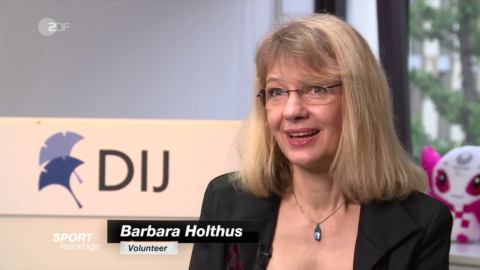
German TV ZDF visited the DIJ to interview deputy director Barbara Holthus about the increasing criticism of the Tokyo Olympics. „There is a danger of the Olympics becoming a superspreader event“, Barbara said. Her comments were broadcast in the ZDF Sport Reportage (23 May 2021) and can be viewed online. Barbara was also interviewed by German radio DLF about the potential cancellation of the Games. She said that she sees only a ten per cent chance for cancellation. „Monetary interests and the power of the IOC are too strong after all.“ In addition, Barbara’s recent interview with German news agency SID on Olympic volunteers can now be viewed on the DIJ’s YouTube channel. For more information on research related to the Olympics, see the DIJ’s special project on the Tokyo Olympics and the open access book publication Japan Through the Lens of the Tokyo Olympics.
DIJ expertise on Tokyo Olympics in international media

DIJ director Franz Waldenberger and deputy director Barbara Holthus have been quoted in several German and international media about recent developments regarding the Tokyo Olympics and their potential cancellation. In an interview with German radio DLF, Franz Waldenberger commented on the merits and demerits of a cancellation of the Games for Japanese companies. „If they have made advance payments, then they are now in a bad situation“, he explained. In a live interview with Korean TV Arirang’s News Center, Barbara Holthus argued that „the Games should not be held at this time, in the midst of a pandemic, at a time when really the whole world is suffering“. In the Daily Mail, she emphasized that holding the Games now was a „recipe for disaster“ and that she was „very scared for the country and for the people of Japan“. For the German news agency SID and the news site Tagesschau, she explained the risks for Olympic volunteers and the general public. „There is a danger that the Games will become a superspreader event“, she commented. For more information on research related to the Olympics, see the DIJ’s special project on the Tokyo Olympics and the open access book publication Japan Through the Lens of the Tokyo Olympics.
Barbara Holthus quoted in New York Times and Mainichi Shinbun
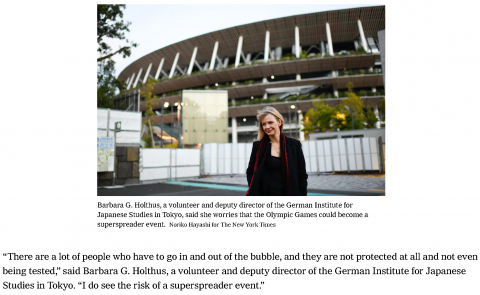
“I do see the risk of a superspreader event,” says Olympic volunteer and DIJ deputy director Barbara Holthus in an interview with the New York Times. In the article How Can the Olympics Protect 78,000 Volunteers From the Coronavirus? (May 2), she explains that Olympic volunteers are told to disinfect their hands, keep distance to visitors, and wear a mask. But they are also asked to address visitors with smiles and hospitality. „I find that very insensitive”, she comments. Barbara is also quoted in the Japanese daily Mainichi Shinbun (April 30), where she comments on the risks of holding the Games during the pandemic, and she is featured in the Mainichi’s series „What to do with the Olympics“ (May 14). For more information on research related to the Olympics, see the DIJ’s special project on the Tokyo Olympics and the open access book publication Japan Through the Lens of the Tokyo Olympics.
Barbara Holthus interviewed about Olympic volunteers
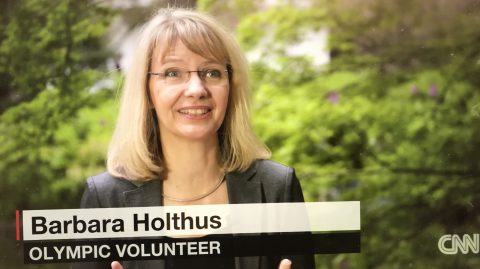
Three months before the scheduled opening of the Tokyo Olympics, DIJ deputy director Barbara Holthus was interviewed by Japanese and international media about Olympic volunteers. In Fuji TV’s news show ‚Viking More‘, Barbara explained that volunteers are provided only with insufficient measures to protect against a Covid infection. There are also neither PCR testing nor vaccinations planned for volunteers. In the Japanese daily Mainichi Shinbun, she commented that the Games should not be held in the midst of the pandemic as they would neither have the expected economic impact nor create a positive legacy. Barbara also appeared on a CNN TV programme which was broadcast 100 days before the scheduled opening of the Games on April 14. What was meant to be a „once-in-a-lifetime“ opportunity has now turned into „a really dangerous experience,“ she said. The video can be viewed here. For more information on research related to the Olympics, see the DIJ’s special project on the Tokyo Olympics and the open access book publication Japan Through the Lens of the Tokyo Olympics.
Barbara Holthus quoted in international media about Tokyo Olympics
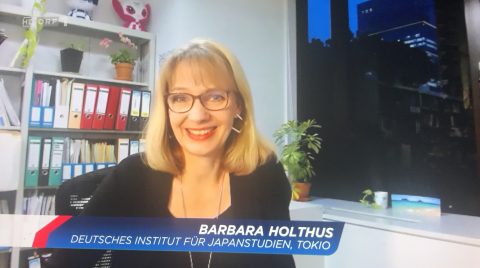
As the Olympic torch relay started this week, the Tokyo Olympics are back in the focus of international media. DIJ deputy director Barbara Holthus was interviewed and quoted by several media about the current mood in Japan towards the Olympics. For CNN International, Barbara comments on Japan’s lost opportunity to re-imagine itself and get an economic boost from Olympia-related tourism. In the New York Times, Barbara explains how the 110,000 volunteers are being prepared for their roles at the Games during the pandemic. In Austrian TV’s ORF Sport am Sonntag, she comments on the exploding costs and the likelihood of the Olympics going ahead as scheduled. For an AP News article, Barbara contextualizes the recent scandals over sexist comments. In Deutsche Welle, she explains why the decision to exclude foreign spectators is a concession to the Japanese people who have become increasingly skeptical of the Olympics. For more information on research related to the Olympics, see the DIJ’s special project on the Tokyo Olympics and the open access book publication Japan Through the Lens of the Tokyo Olympics.
Barbara Holthus interviewed about 3.11 by German newspaper
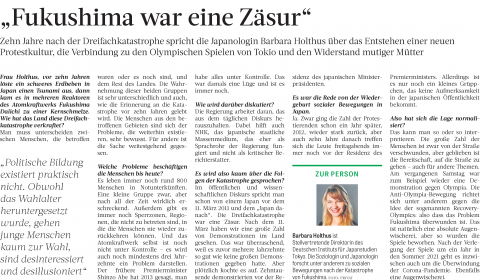
The German newspaper Frankfurter Rundschau has interviewed DIJ deputy director Barbara Holthus about the continuing effects of the ‚triple disaster‘ on Japanese society. In „Fukushima war eine Zäsur“ (Fukushima was a watershed), Barbara explains how 3.11 has caused the rebirth of social movements in Japan, increased mistrust of the Japanese government and of mainstream media, and also influences the critical attitude of many Japanese towards the Tokyo Olympics. „The anti-Olympics movement is directed, among other things, against the idea of the so-called Recovery Olympics: that the problem of Fukushima has been overcome. Of course, this is absolute eyewash, but that’s how the Games were advertised“. Barbara’s current research includes projects on Social movements and gender in post-3.11 Japan and a special project on the Tokyo Olympics. The newspaper article appeared online and in the FR’s print edition on March 10. A collection of DIJ research and publications related to 3.11 is available here.

















 Open Access
Open Access 
